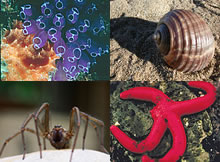Do you want to test yourself on how much you know about spineless animals?? Link to the website below and find out. Watch the video first, then do the quiz. Print out your results and bring them to class.
http://www.brainpop.co.uk/science/lifeprocessesanimalsandplants/invertebrates/
Now, let´s examine some invertebrate animals in detail: Sponges and molluscs. Link again to the following addresses, watch the two videos and take the quizzes. Don´t forget to print out your results...
http://www.brainpop.co.uk/science/lifeprocessesanimalsandplants/sponges/preview.weml
http://www.brainpop.co.uk/science/lifeprocessesanimalsandplants/molluscs/preview.weml
To finish, answer this question: Are spiders insects?... To make sure about it, link here, watch the last two videos and do the corresponding quizzes. Print them out!
 http://www.brainpop.co.uk/science/lifeprocessesanimalsandplants/spiders/
http://www.brainpop.co.uk/science/lifeprocessesanimalsandplants/spiders/
Remember that 97% of Earth´s animals are invertebrates!!!
Now, let´s examine some invertebrate animals in detail: Sponges and molluscs. Link again to the following addresses, watch the two videos and take the quizzes. Don´t forget to print out your results...
http://www.brainpop.co.uk/science/lifeprocessesanimalsandplants/sponges/preview.weml
http://www.brainpop.co.uk/science/lifeprocessesanimalsandplants/molluscs/preview.weml
To finish, answer this question: Are spiders insects?... To make sure about it, link here, watch the last two videos and do the corresponding quizzes. Print them out!

Remember that 97% of Earth´s animals are invertebrates!!!



